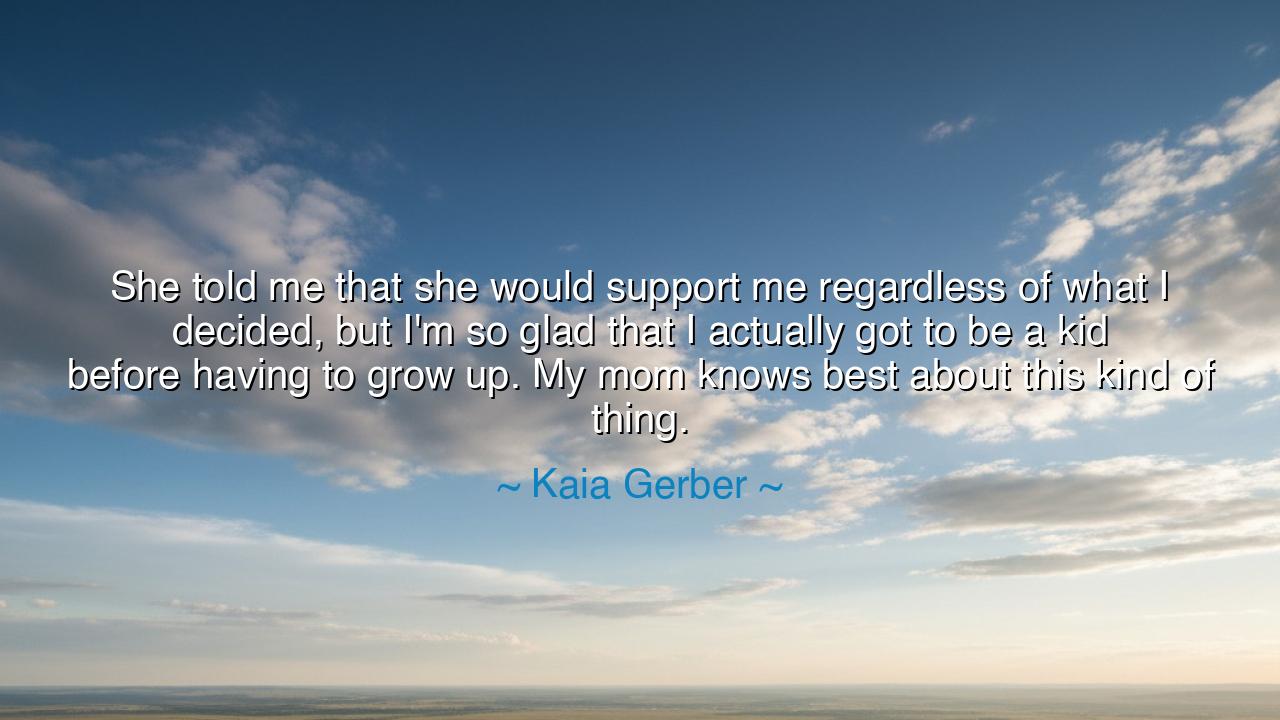
She told me that she would support me regardless of what I
She told me that she would support me regardless of what I decided, but I'm so glad that I actually got to be a kid before having to grow up. My mom knows best about this kind of thing.






The words of Kaia Gerber, “She told me that she would support me regardless of what I decided, but I'm so glad that I actually got to be a kid before having to grow up. My mom knows best about this kind of thing,” carry the quiet wisdom of youth guided by love. Beneath their simplicity lies an eternal truth: that a mother’s counsel, born from experience and care, protects the soul before the world tests it. Kaia speaks not only of gratitude but of grace — of the unseen wisdom that helps a child remain whole in an age that demands too much, too soon.
In the ancients’ understanding, childhood was sacred — a garden in which the spirit could bloom before the storms of life began. The great philosophers taught that growth should not be rushed, for the soul unfolds like a flower, not like a machine. Kaia’s mother, herself a woman who walked the path of fame and scrutiny, knew this truth. She saw that innocence, once lost, cannot be reclaimed; that wonder, once hurried, fades into weariness. Her guidance, wrapped in gentleness, was a shield — one that allowed her daughter to be a child before becoming a star, to build her roots before reaching for the light.
When Kaia says, “My mom knows best about this kind of thing,” she does not speak of blind obedience, but of trust born from love. The ancients believed that wisdom passes down through the generations, not in commands, but in example — that a mother’s life becomes her teaching. Kaia’s mother had lived under the gaze of the world, felt its pressures and illusions, and thus understood what innocence must be protected from. Her wisdom was not restrictive but liberating: it allowed her child to choose her path with both freedom and foundation.
History, too, tells us of those who lost their childhood to the world’s demands and paid dearly for it. Consider Mozart, the prodigy whose genius astonished the courts of Europe while he was still a boy. He played before kings and queens, yet his youth was consumed by expectation, and his adulthood haunted by exhaustion and sorrow. His brilliance burned too brightly, too soon — a reminder that when the world takes hold of the child before the heart has matured, the gift becomes a burden. In Kaia’s story, we find the opposite: a child allowed to breathe, to laugh, to dream without demand — and thus to enter the world whole.
There is also a profound reverence in her gratitude. To say “I got to be a kid before having to grow up” is to recognize the rarity of such a blessing in our age. Many rush toward adulthood, mistaking freedom for fulfillment, only to find themselves longing for the simplicity they abandoned. The ancients warned against this haste. They taught that the soul must move in rhythm with its own seasons: play before duty, curiosity before certainty, gentleness before ambition. For only those who have known true youth — joy untainted by performance — can enter maturity with balance and strength.
And what of the mother’s role in all this? She is the guardian of time, the keeper of boundaries, the one who reminds the child that not every door must be opened too early. Her wisdom is not control, but care — a knowing that life’s sweetness fades if tasted before its hour. Kaia’s words remind us that such guidance is a form of love more enduring than indulgence. For a mother’s greatest gift is not the freedom to do everything, but the wisdom to wait, to grow, and to rise when ready.
The lesson, then, is this: honor the pace of your becoming. Do not rush to wear the mask of adulthood before your spirit has learned to breathe. Seek the counsel of those who love you not for what you achieve, but for who you are. And if you are one who guides — a parent, a teacher, an elder — remember that patience is the truest form of protection. As Kaia’s mother knew, to preserve a child’s innocence is to give them the strength to face the world with clarity, not confusion.
So remember, children of the future: listen to those who have walked before you, for their wisdom is written not in words, but in the scars and triumphs of their own lives. Grow slowly, love deeply, and let your dreams unfold in their time. For as Kaia Gerber reminds us through the grace of her mother’s wisdom — to be a child before becoming an adult is not a delay, but a blessing, one that allows the spirit to rise whole, steady, and shining into the world.






AAdministratorAdministrator
Welcome, honored guests. Please leave a comment, we will respond soon